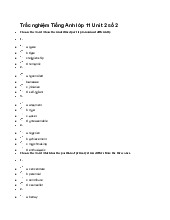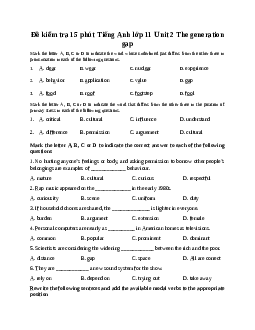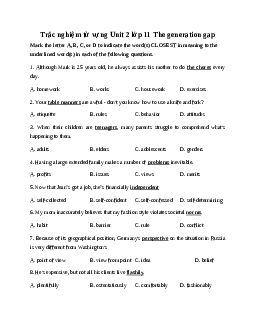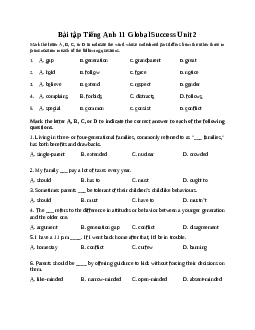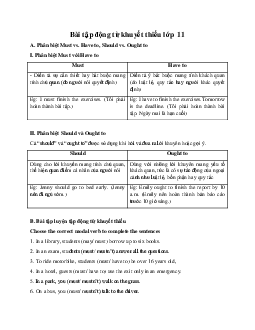



Preview text:
Tiếng Anh 11 Global Success Unit 2 Writing
An opinion essay about limiting teenagers' screen time
(Bài luận nêu ý kiến về việc giới hạn thời gian dùng thiết bị điện tử của thanh thiếu niên)
1. Work in pairs. Complete the notes using the sentences (A-D) in the box.
(Làm việc theo cặp. Hoàn thành các ghi chú bằng cách sử dụng các câu (A-D) trong hộp.) Gợi ý đáp án
1. Too much screen time is bad for teenagers’ health
2. Too much screen time can damage eyesight, reduce sleep time, and cause weight gain.
3. The gap between teenagers and parents may become wider.
4. Teenagers may think their parents are not fair to them. Lời giải chi tiết
SHOULD PARENTS STRICTLY LIMIT TEENAGERS SCREEN TIME?
(Bố mẹ có nên nghiêm khắc giới hạn thời gian xem màn hình?) SHOULD SHOULDN'T (Nên) (Không nên)
Reason 1: Teenagers have little time left for Reason 1: Quality of screen time is more homework. important than quantity.
(Lý do 1: Thanh thiếu niên có ít thời gian (Lý do 1: Chất lượng thời gian trên màn
để làm bài tập về nhà.)
hình quan trọng hơn số lượng.)
Examples/Facts/Explanations: Teenagers Examples/Facts/Explanations: Teenagers
spend too much time watching online can learn a lot of useful knowledge and
videos, checking social media, or playing necessary skills through online educational computer games. games and videos.
(Ví dụ/Sự thật/Giải thích: Thanh thiếu niên (Ví dụ/Sự thật/Giải thích: Thanh thiếu niên
dành quá nhiều thời gian để xem video trực có thể học được nhiều kiến thức hữu ích và
tuyến, kiểm tra phương tiện truyền thông kỹ năng cần thiết thông qua các trò chơi và
xã hội hoặc chơi trò chơi trên máy tính.)
video giáo dục trực tuyến.)
Reason 2: (1) Too much screen time is bad Reason 2: (3) The gap between teenagers for teenagers' health. and parents may become wider.
(Lý do 2: Quá nhiều thời gian trên màn (Lý do 2: Khoảng cách giữa thanh thiếu
hình có hại cho sức khỏe của thanh thiếu niên và cha mẹ có thể trở nên rộng hơn.) niên.) Examples/Facts/Explanations: (4)
Examples/Facts/Explanations: (2) Too Teenagers may think their parents are not
much screen time can damage eyesight, fair to them.
reduce sleep time, and cause weight gain.
(Ví dụ/Sự thật/Giải thích: Thanh thiếu niên
(Ví dụ/Sự thật/Giải thích: Quá nhiều thời có thể nghĩ rằng cha mẹ không công bằng
gian trên màn hình có thể gây hại cho thị với họ.)
lực, giảm thời gian ngủ và gây tăng cân.)
2. Read an opinion essay and match each paragraph with the correct description.
(Đọc một bài luận và nối từng đoạn với mô tả chính xác.) Gợi ý đáp án 1. D 2. C 3. A 4. B
3. Write an opinion essay (120-150 words) stating the opposite view.
(Viết một bài luận (120-150 từ) nêu quan điểm ngược lại.)
Digital devices play an essential part in teenagers' lives nowadays. I strongly believe that
parents should not strictly limit their children's screen time for the following reasons.
First of all, ______________________.
In addition, _____________________.
In conclusion, ___________________. Gợi ý đáp án
Digital devices play an essential part in teenagers' lives nowadays. I strongly believe that
parents should not strictly limit their children's screen time for the following reasons.
First of all, they can be used for both research and study purpose. Students can access
Internet to download data and store information and textbooks, which save amounts of
money for paper books and time. This also means their backpacks are lighter but contain bigger data.
In addition, modern technology tools improve their study results because of a wide
variety of useful learning applications on smartphones, laptop, tablets and other media
players such as dictionary, spelling, translation, pronunciation and other apps. These apps
are not boring but exciting them with colorful designed-courses, funny methods and
attractive contents. Furthermore, students can study any time, anywhere as long as their
devices are connected to Internet.
In conclusion, personal electronic devices bring more benefits than harm to students. I
suggest that teachers allow and encourage the use of these devices in learning both inside and outside of class.
